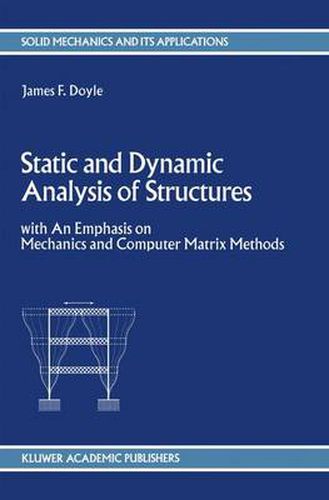Readings Newsletter
Become a Readings Member to make your shopping experience even easier.
Sign in or sign up for free!
You’re not far away from qualifying for FREE standard shipping within Australia
You’ve qualified for FREE standard shipping within Australia
The cart is loading…






This title is printed to order. This book may have been self-published. If so, we cannot guarantee the quality of the content. In the main most books will have gone through the editing process however some may not. We therefore suggest that you be aware of this before ordering this book. If in doubt check either the author or publisher’s details as we are unable to accept any returns unless they are faulty. Please contact us if you have any questions.
This book is concerned with the static and dynamic analysis of structures. Specifi cally, it uses the stiffness formulated matrix methods for use on computers to tackle some of the fundamental problems facing engineers in structural mechanics. This is done by covering the Mechanics of Structures, its rephrasing in terms of the Matrix Methods, and then their Computational implementation, all within a cohesivesetting. Although this book is designed primarily as a text for use at the upper-undergraduate and beginning graduate level, many practicing structural engineers will find it useful as a reference and self-study guide. Several dozen books on structural mechanics and as many on matrix methods are currently available. A natural question to ask is why another text? An odd devel opment has occurred in engineering in recent years that can serve as a backdrop to why this book was written. With the widespread availability and use of comput ers, today’s engineers have on their desk tops an analysis capability undreamt of by previous generations. However, the ever increasing quality and range of capabilities of commercially available software packages has divided the engineering profession into two groups: a small group of specialist program writers that know the ins and outs of the coding, algorithms, and solution strategies; and a much larger group of practicing engineers who use the programs. It is possible for this latter group to use this enormous power without really knowing anything of its source.
$9.00 standard shipping within Australia
FREE standard shipping within Australia for orders over $100.00
Express & International shipping calculated at checkout
Stock availability can be subject to change without notice. We recommend calling the shop or contacting our online team to check availability of low stock items. Please see our Shopping Online page for more details.
This title is printed to order. This book may have been self-published. If so, we cannot guarantee the quality of the content. In the main most books will have gone through the editing process however some may not. We therefore suggest that you be aware of this before ordering this book. If in doubt check either the author or publisher’s details as we are unable to accept any returns unless they are faulty. Please contact us if you have any questions.
This book is concerned with the static and dynamic analysis of structures. Specifi cally, it uses the stiffness formulated matrix methods for use on computers to tackle some of the fundamental problems facing engineers in structural mechanics. This is done by covering the Mechanics of Structures, its rephrasing in terms of the Matrix Methods, and then their Computational implementation, all within a cohesivesetting. Although this book is designed primarily as a text for use at the upper-undergraduate and beginning graduate level, many practicing structural engineers will find it useful as a reference and self-study guide. Several dozen books on structural mechanics and as many on matrix methods are currently available. A natural question to ask is why another text? An odd devel opment has occurred in engineering in recent years that can serve as a backdrop to why this book was written. With the widespread availability and use of comput ers, today’s engineers have on their desk tops an analysis capability undreamt of by previous generations. However, the ever increasing quality and range of capabilities of commercially available software packages has divided the engineering profession into two groups: a small group of specialist program writers that know the ins and outs of the coding, algorithms, and solution strategies; and a much larger group of practicing engineers who use the programs. It is possible for this latter group to use this enormous power without really knowing anything of its source.